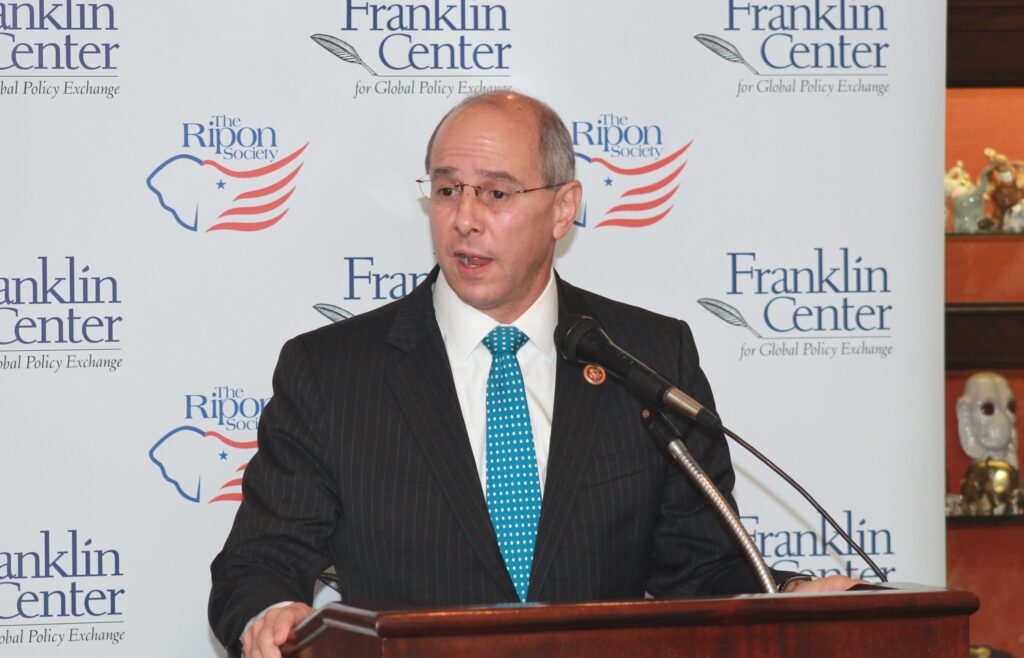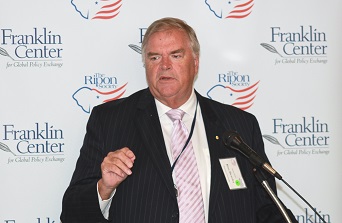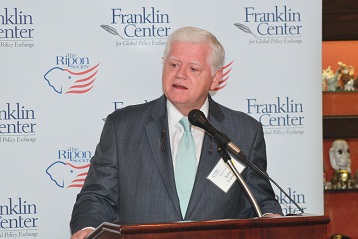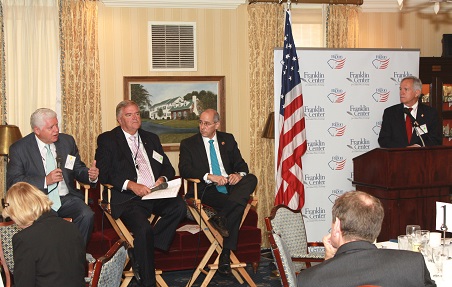Australian Ambassador Beazley Joins Trade Subcommittee Members Boustany & Larson in Discussing the Trans-Pacific Partnership

WASHINGTON, DC – As negotiations between the 12 Pacific Rim nations that form the Trans-Pacific Partnership continue, The Ripon Society held a breakfast discussion Wednesday morning focusing on the impact that this strategic trade alliance would have for both the U.S. and Australian economies alike.
Participating in the discussion were The Honorable Kim Beazley, the Australian Ambassador to the United States, and two members of the Ways and Means Subcommittee on Trade: Democratic Congressman John Larson (CT-1), and Republican Congressman Charles Boustany (LA-3), who began the discussion noting how the TPP can be a catalyst for growth.
“The Trans-Pacific Partnership is so important on so many levels,” Boustany stated. “First of all, it’s a big trade agreement — especially now that Japan is part of it – representing 40 percent of the world GDP, and 40 percent of US global trade. This is a big economic package that comes at a time when we’ve had slow global growth, and trade volume has sort of been on the downside. This is an opportunity to really rejuvenate the global trading system. It’s also an opportunity to come up with a 21st century high level trade agreement that allows for Australia, the United States, and Japan to take a real leadership for all in the economic sphere internationally.

“It will set the stage for all future trade agreements. Combined with the Transatlantic Trade and Investment Partnership, this is our main vehicle for rejuvenating our global trading system. But it’s much more than a commercial agreement. This agreement also sends a very strong signal to the reformers in China to move forward on economic reform.”
The fifth-term lawmaker from Louisiana also took time to explain how bipartisan support for Trade Promotion Authority is also critical to our trade interests.
“If we don’t get Trade Promotion Authority,” Boustany warned, “we will not get the strongest agreement, period. It’s very clear to me. Our very able negotiators, I think, are doing a very good job. I applaud the efforts. But we need the full force of the American government behind them. And that means Republican and Democratic support for Trade Promotion Authority. That will not only send a very strong signal to our trading partners in the Asia-Pacific region who are negotiating TPP, but also a very strong signal to our European partners as we look at T-TIP.”
Ambassador Kim Beazley – who has served as Australia’s top diplomat in Washington since 2010 – concurred with Congressman Boustany and discussed how increased agriculture exports under TPP will strengthen the middle class.
“The health, happiness, strength and prosperity of the American people is in the Australian nation’s interest,” he stated. “And because it is in the Australian nation’s interest, I do feel that I’ve got some right to talk a little bit about it. In the situation at the moment, this late phase of the negotiation of the TPP does revolve very much, in particular, around Australian agriculture. We do have a discussion revolving around agriculture as we are a huge agricultural producer. If you look at the population prediction and the demand prediction in the region, neither of us are producing up to speed to be able to deal with demand opportunities that are going to arise 20 to 30 years out from now.”
“This is the great opportunity for the American middle class. This is the one thing on the horizon that could generate serious opportunities for an increase in the income of the American middle class,” Ambassador Beazley said. He added that the American middle class had faced a very challenging situation over the past 30 years and the current difficulties for the middle class were obvious. “Domestic consumption – despite your brilliant export record – domestic consumption has always been the great driver of the American economy. It is not able to form that role as it did once before because the consuming capacity of the American middle class has been seriously undermined.”

“What the United States middle class needs is the capacity to see wealth for its wonderful product and its services generated elsewhere. The Asia-Pacific region, where this agreement will set the rules, currently has 590 million members of the global middle class — that is 20 percent of the global middle class. Fifteen years from now, that figure is going to be three billion, and 60 percent of the global middle class.”
Larson shared his insights about the legislative hurdles currently facing TPP.
“The truth of the matter is, this has become mired down because of real differences,” the Connecticut lawmaker explained. “Most of the deepest differences, I think, are emotional ones. It gets directly to what the Ambassador is saying, and that is that a number of Americans feel left out in this process.
“It’s interesting to see in both political parties the resistance that is taking place. You would expect and anticipate resistance from the left and from labor on the Democratic side. They are still smarting from NAFTA, CAFTA and do not see trade as benefitting the middle class. They see it in terms of the job losses and the emptied-out factories that they are living in. They don’t see this as a winner. So we have to work harder. Ambassador Froman has been doing that. The AFL-CIO has been brought in for all of these discussions that are taking place. But Harry Reid has said it’s not going to move forward this year.”
Congressman Larson – who began serving central Connecticut in 1999 and previously served as Chairman of the House Democratic Caucus – also warned of a growing Chinese trade influence across the globe.
“We have not had a foreign policy, an effective trade policy, since John Kennedy said ‘We should have an alliance for progress with Central and South America,’” he observed. “And if we do not align for progress in Central and South America, then we are going to be watching the Chinese align themselves in those areas.”

In response to a question, Ambassador Beazley stressed the importance of raising the awareness of beneficial trade policy like TPP.
“In the 1980’s, we unilaterally disarmed,” he stated. “We collapsed Australian trade barriers, we collapsed quotas, and the government of the day, which incorporated a large part of the union movement, decided Australia had had it. We could not sustain ourselves on the basis of the economy of Australia, for good or ill, and we had to float ourselves globally. We need more knowledge of it, we need to understand the significance of what is being agreed here, and hopefully when this is concluded, there will be an educative campaign that will achieve that. That, I think, is a major difference between the discussion in Australia and the discussion here.”
When asked about the prospects of TPP being passed during the upcoming lame duck session of Congress, Congressman Boustany expressed hope that an agreement could be reached, but was realistic as well.
“I think it will be very difficult to get a fast track or TPA done in the lame duck, as not enough groundwork has been done,” he said. “You’ll have to come in on the Democratic side of the aisle, and I think there is a lot more that needs to be done there. On the Republican side, I think we can get the votes, but we want this to be bipartisan, so I think that all effort should be made now in preparation to see how far we can go. Hopefully, we can get it done early next year.”
To view the complete remarks of Boustany, Beazley, and Larson before The Ripon Society’s breakfast discussion Wednesday morning, please click on the link below:
The Ripon Society is a public policy organization that was founded in 1962 and takes its name from the town where the Republican Party was born in 1854 – Ripon, Wisconsin. One of the main goals of The Ripon Society is to promote the ideas and principles that have made America great and contributed to the GOP’s success. These ideas include keeping our nation secure, keeping taxes low and having a federal government that is smaller, smarter and more accountable to the people.



